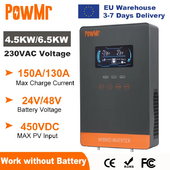hi, hope your all well, and enjoying free electric, chuckles.
Im just about to order a edecoa hybrid inverter model em-452a, its perfect for my setup, as from my solar array im getting 4400 watts,, but i cant seem to find this model listed on the edecoa official website, does anyone have experience with this model ?.
I'm also confused, the maximum watts from my solar panels should be 4200 but im getting 4400. i have 6 trina boards and two longi boards.
Im just about to order a edecoa hybrid inverter model em-452a, its perfect for my setup, as from my solar array im getting 4400 watts,, but i cant seem to find this model listed on the edecoa official website, does anyone have experience with this model ?.
I'm also confused, the maximum watts from my solar panels should be 4200 but im getting 4400. i have 6 trina boards and two longi boards.




